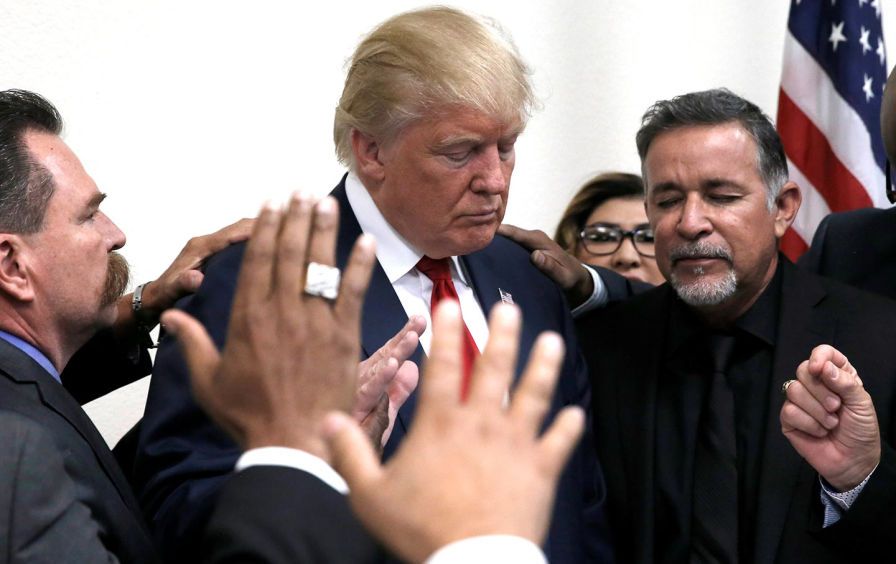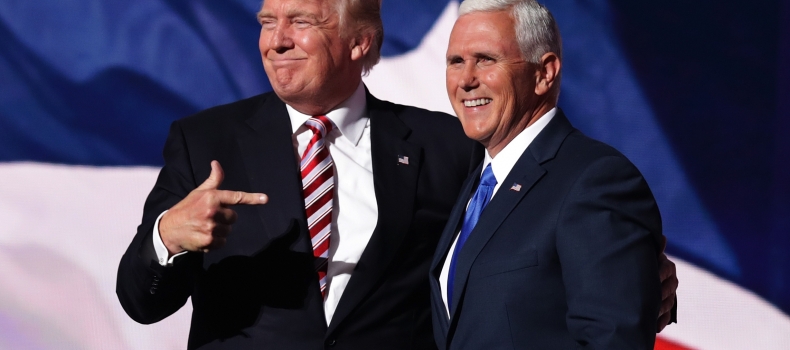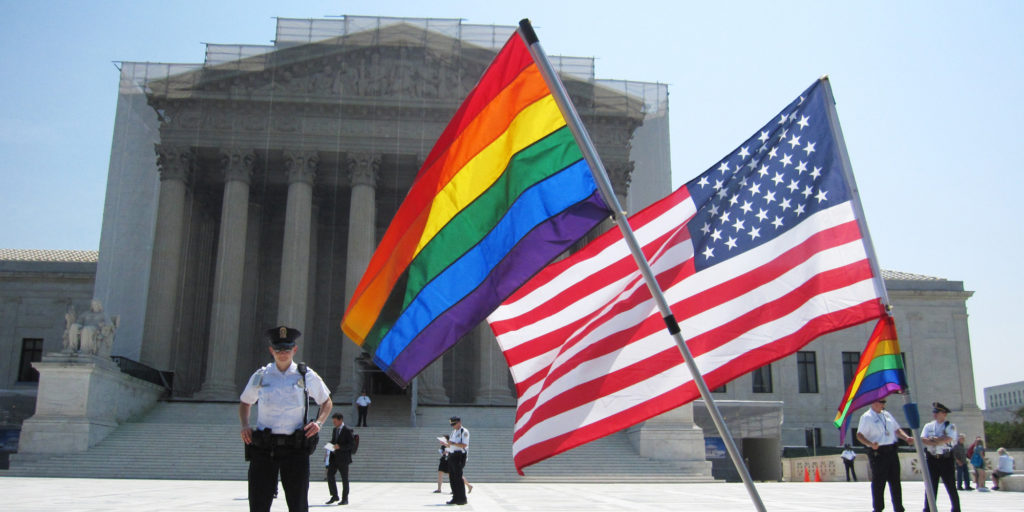
Bedfellows: the Steady Infiltration of Evangelicals in the White House
Trump’s voter base made easy bedfellows of politics and religion, blurring the line of separation between church and state. But as white evangelicals shrink to a smaller fringe in the Secular Age, will their political power also decline?
By James A. Haught
White evangelicals put Donald Trump into the White House. They swarmed to the 2016 election in high numbers and gave an amazing 81 percent of their votes to the vulgar, obnoxious, race-baiting, gambling billionaire who favors the rich, tries to take health care away from 20 million, and brags about grabbing women by their genitals.
Although he once seemed to favor women’s rights, Trump campaigned on a promise to appoint only pro-life Supreme Court justices–those who would jail women and doctors for ending pregnancies.
For his running mate, Trump chose an evangelical hero, Indiana Governor Mike Pence, known for fighting the theory of evolution and attacking marriage equality and LGBT rights. Pence notoriously signed an Indiana “religious freedom” law letting fundamentalists discriminate against gays.

Together, Trump and Pence were a dream ticket for conservative Christians. Jesus said to heal the sick, feed the hungry, clothe the naked, comfort the suffering, embrace the poor–all the humane facets of the liberal “safety net.” But today’s U.S. fundamentalists vote for the GOP, which tries to slash the safety net to give tax breaks to the rich. They contradict the teachings of Jesus, but few seem to notice.
Of course, other factors besides religion also swayed the 2016 presidential race, such as economic despair among less-educated blue-collar whites. But it’s abundantly clear: without strong born-again backing, Trump and Pence would have lost “bigly.”
However, there’s hope that the 2016 travesty may be a final spasm for America’s “religious right” politics. The United States is creeping steadily toward a religion-free culture. Puritanical church power over the nation keeps weakening, decade after decade. I hope the retreat continues.
I grew up in Appalachia’s Bible Belt, where fundamentalist taboos ruled politics and daily life. Censorship, blue Sabbath laws, mandatory school prayer, “dry” laws, and other strictures prevailed. But the Bible Belt thou-shalt-nots of my youth slowly slipped away thanks to the sexual revolution, Supreme Court rulings, and cultural evolution. Church taboos slowly evaporated.
“The Bible Belt thou-shalt-nots of my youth slowly slipped away thanks to the sexual revolution, Supreme Court rulings, and cultural evolution.”
A secular surge swept Europe after World War II. Church attendance plummeted. Nations that had spent centuries killing people over religion–in Crusades, Inquisitions, witch-hunts, pogroms, Reformation wars, persecutions, holy wars and massacres–decided that religion was inconsequential.
Europe’s transformation spread to Canada, Australia, New Zealand, Japan and other advanced democracies.
At first it seemed that America, a place where religion remained strong, was an exception. But, in recent decades, America rapidly caught up with the Western world. Religion seems to be losing its grip on the country.
Church decline started in the 1960s when tall-steeple mainline denominations began losing members. Then the erosion spread to evangelicals and Catholics.
The Southern Baptist Church has lost 1 million members in the past decade. And so many white followers left Catholicism that one-tenth of U.S. adults now are ex-Catholics.
The number of Americans who say their faith is “none” soared remarkably since 1990. Now “nones” are America’s largest group, around one-third of the adult population – outnumbering Catholics (21 percent) and white evangelicals (16 percent).
Barack Obama was the first president to welcome skeptic groups to the White House and recognize “those who have no religion” as equal citizens.
The Supreme Court ruling in favor of gay marriage was a crippling blow to hidebound Christianity.

Almost overnight, the Secular Age has hit America like a tsunami. As white evangelicals shrink to a smaller fringe, their political power surely will decline.
In his landmark book, The End of White Christian America, Robert P. Jones of the Public Religion Research Institute says young Americans who say their religion is “none” generally are socially liberal, and supportive of gay rights, universal health care, women’s right to choose, and the like. But they hardly vote. Apparently they shun politics as much as they shun religion. This gives white evangelicals, although fading, an advantage.
“Young Americans who say their religion is ‘none’ generally are socially liberal, and supportive of gay rights, universal health care, women’s right to choose, and the like. But they hardly vote.”
Jones wrote that 2016 may have signified a “death rattle” for fundamentalist political power. In a New York Times commentary, he said:
“The waning number of white Christians in the country today may not have time on their side, but as the sun is slowly setting on the cultural world of white Christian America, they’ve managed, at least in this election, to rage against the dying of the light.”
Will “religious right” politics recede as the Secular Age grows in America? Will fading evangelicals lose their power to tip the presidency to leaders like the Trump-Pence team?
Let’s pray the secular tide keeps rising, to reaffirm humane values in America.
Jim Haught is editor emeritus of West Virginia’s largest newspaper, The Charleston Gazette-Mail. He can be reached at haught@wvgazettemail.com. This essay expands upon his 2014 book Religion is Dying.